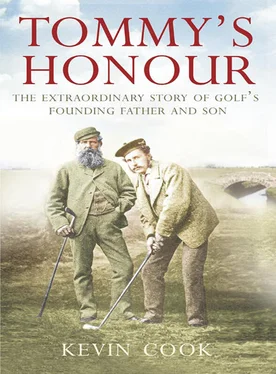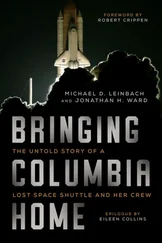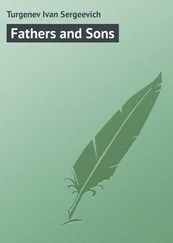Finishing his story, Tom Morris looked as proud as if his own niblick were the stroke oar.
Tommy was, as ever, amazed by this story. A hundred and twelve? That was worse than straight sixes. He was no admirer of his father’s bosses, the club men in their red golfing jackets, calling themselves Captain this and Major that, wagering tens and scores of pounds and then swinging and missing. ‘God save Captain Maitland-Dougall,’ he said, still shaking his head at a winning score of 112.
Tommy won the High Hole but lost the eighth when his father rolled in a putt for a deuce (and tipped his cap). The eighth, ninth, tenth and eleventh holes were where the course reached the top of its shepherd’s-crook shape and doubled back towards town. On the evil eleventh, Tommy’s tee shot met a sudden gust of wind, struck the face of the Hill Bunker and slid straight down. No one could save three from there. But his father took three putts (and Tommy tipped his cap). They halved the hole. The boy was still two holes ahead.
From the twelfth teeing-ground they could see the town’s old towers. To the west was the Eden Brae, a grassy slope that leaned down to the mudflats where the River Eden fed into the sea. Fisher-women toiled down there, moving through acres of mussel-scalps a hundred yards out, gathering mussels for their men to use as bait. A wrack-picker shoved a wheelbarrow along the sand, heading for the corner where the tides brought great tangles of wrack – seaweed – that would fertilize gardens all over town. As a rule, the golfer and the wrack-picker eyed each other warily, each thinking the other a fool for doing the world’s dullest chore. But like everyone in town, this straggle-bearded wrack-gatherer knew Tom Morris. He looked up and waved.
Tom waved back. He took a deep, bracing breath of salt air and turned from the brae to the work at hand. He tossed a blade of grass to gauge the wind, then hit a modest drive, straight as a telegraph wire. It was easy to spend strokes on the way in. He spent carefully, tacking his way through the next three holes, giving Tommy every chance to stumble. Which Tommy did on the long fourteenth, hitting a spoon that rolled into Hell Bunker. Three swings later he rose from Hell with his face pink, hot with shame. His advantage cut to one hole, he was dying to make up for his blunder. And so, after a clean four on the fifteenth hole, he did exactly what his father expected him to do at the sixteenth: he took the bold line off the tee, smacking his drive up the right side along the railway tracks. It was the wrong play. You could make three that way – or seven or eight. But sometimes the wrong play works. Tommy’s drive landed 200 yards out, hopped to the right and stopped just shy of the tracks. Safe by the length of a thumb. From there he hit a spoon to two-putt distance and the hole was his. That made him dormy: leading by two holes with two to play, he could not lose. His father’s only hope was to win both of the last two holes to salvage a half, a draw.
Tommy had the honour at the Road Hole. He knocked his drive over the railway sheds, but turned his wrists a hair too soon. The ball hooked into knee-high grass. Three swings later he lay four in the greenside bunker, with Tom lying three on the edge of the green. Tommy scraped out of the sand and now lay five, forty feet from the flag. He shrugged and picked up his ball, conceding the hole. He was one hole up with one to play.
The Home Hole was short, less than 300 yards. Tom’s drive wasn’t long, but it was straight. By now there were golfers milling around the clubhouse – club members in red jackets. A few spectators, early-rising townsmen, stood near a mudpile behind the Home green. Two shovels jutted up from the mudpile, which was roped off with wood stakes and fishing line. Tom was building a new green up there, above and behind the current one. To reach it, future golfers would have to play over or through the hollow where the green was now. He had been casting about for a name for that hollow, a memorable name to fit with the old reliable Hell Bunker and Elysian Fields – ‘Shady Acre’ or ‘Slough of Despond’, something like that.
Teeing up, Tommy spat on his fingers. If he won or halved the last hole, he would carry the day. He took his stance and gave the ball a swat. His drive climbed towards the clouds over the town, blue-grey clouds split by shafts of sunlight. He lost sight of the ball, but the spectators watched it bounce thirty yards past his father’s. Tommy heard shouts and clapping as he crossed the old stone bridge over the Swilcan Burn, and he couldn’t help himself – he waved.
All this time, Tom Morris was busy playing golf. He bumped his ball to the hollow, just hard enough to send it running towards the flag. Would it fall for a deuce? There was new applause, then a groan as the ball slipped past the hole. Still, Tom’s three was a sure thing. Tommy had two strokes left to win the match.
He had thirty yards to the flag: a twenty-yard bump and ten yards of roll. But there was a patch of ankle-high grass just short of the green. He would have to clear that grass by an inch or two.
As he circled his ball, studying his lie, a pair of red-coated club men came to stand behind him. ‘I’d putt it,’ one said.
Tommy’s chip cleared the ankle-high grass, but by too much. It ran three paces past the hole. The redcoats were quiet. The whole town was quiet. Except for Tom Morris, who nodded at the ball and said, ‘You’re still away, son.’
The putt was uphill. It would go left, but if he aimed for the right-hand edge of the hole and hit it hard, it would fall. Tommy drew back his putter and rapped the ball, hard.
In it went. The redcoats whooped. Tom Morris nodded again. He walked past the hole and offered a handshake and, in that moment, Tommy was so happy that he didn’t want to blink. He didn’t want to move from this spot. He leaned back and flung his putter straight up at the sky. The club rose, turning like the wheels in God’s pocket-watch.
Конец ознакомительного фрагмента.
Текст предоставлен ООО «ЛитРес».
Прочитайте эту книгу целиком, купив полную легальную версию на ЛитРес.
Безопасно оплатить книгу можно банковской картой Visa, MasterCard, Maestro, со счета мобильного телефона, с платежного терминала, в салоне МТС или Связной, через PayPal, WebMoney, Яндекс.Деньги, QIWI Кошелек, бонусными картами или другим удобным Вам способом.












